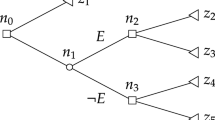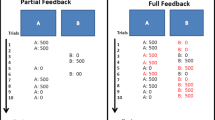Abstract
We examine if and to what extent choice dispositions can allow dependence on contexts and maintain consistency over time, in a dynamic environment under uncertainty. We focus on one of the context dependence properties, opportunity dependence because of being affected by anticipated regret, where the consequentialist choice framework is maintained. There are two sources of potential inconsistency: one is arrival of information, and the other is changing opportunities. First, we go over the general method of resolution of potential inconsistency, by taking any kinds of inconsistency as given constraints. Second, we characterize a class of choice dispositions that are consistent to information arrival, but may be inconsistent to changing opportunities. Finally, we consider the overall requirement of dynamic consistency and show that it necessarily implies each of consistency to information arrival and independence of choice opportunities. The last result states that the two kinds of potential inconsistency cannot “compensate” each other to recover dynamic consistency overall.
Similar content being viewed by others
References
Anscombe F. J., Aumann R. J. (1963) A definition of subjective probability. Annals of Mathematical Statistics 34: 199–205
Benartzi S., Thaler R. H. (2001) Naive diversification strategies in defined contribution saving plans. American Economic Review 91(1): 79–98
Bergemann, D., & Schlag, K. (2005). Robust monopoly pricing: The case of regret, working paper. Yale University.
Chernoff H. (1954) Rational selection of decision functions. Econometrica 22: 422–443
Chun Y. (1988) The equal-loss principle for bargaining problems. Economics Letters 26(2): 103–106
Epstein L. G. (1983) Stationary cardinal utility and optimal growth under uncertainty. Journal of Economic Theory 31: 133–152
Epstein L. G. (2006) An axiomatic model of non-Bayesian updating. Review of Economic Studies 73: 413–436
Epstein L., Le Breton M. (1993) Dynamically consistent beliefs must be Bayesian. Journal of Economic Theory 61(1): 1–22
Epstein L., Schneider M. (2003) Recursive multiple-priors. Journal of Economic Theory 113(1): 1–31
Ferejohn J. A., Fiorina M. P. (1974) The paradox of not voting: A decision theoretic analysis. American Political Science Review 68(2): 525–536
Ghirardato P. (2002) Revisiting savage in a conditional world. Economic Theory 20: 83–92
Ghirardato P., Marinacci M. (2002) Ambiguity made precise: A comparative foundation. Journal of Economic Theory 102: 251–289
Gilboa I., Schmeidler D. (1989) Maxmin expected utility with a non-unique prior. Journal of Mathematical Economics 18: 141–153
Gul F., Pesendorfer W. (2001) Temptation and self-control. Econometrica 69(6): 1403–1435
Gul F., Pesendorfer W. (2004) Self-control and the theory of consumption. Econometrica 72(1): 119–158
Hammond P. J. (1976) Changing tastes and coherent dynamic choice. Review of Economic Studies 43(1): 159–173
Hanany E., Klibanoff P. (2007) Updating preferences with multiple priors. Theoretical Economics 2(3): 261–298
Hanany, E., & Klibanoff, P. (2008). Updating ambiguity averse preferences, mimeo, Northwestern University.
Hayashi T. (2008) Regret aversion and opportunity dependence. Journal of Economic Theory 139(1): 242–268
Hayashi T. (2009) Stopping with anticipated regret. Journal of Mathematical Economics 45(7–8): 479–490
Kahneman D., Tversky A. (1979) Prospect theory: An analysis of decision under risk. Econometrica 44(1): 79–89
Kalai E., Smorodinsky M. (1975) Other solutions to Nash’s bar-gaining problem. Econometrica 43: 513–518
Koopmans T. (1960) Stationary ordinal utility and impatience. Econometrica 28: 287–309
Krähmer, D., & Stone, R. (2005). Dynamic regret theory, working paper. Freie Universität Berlin/University of College London.
Kreps D., Porteus E. L. (1978) Temporal resolution of uncertainty and dynamic choice theory. Econometrica 46: 185–200
Laibson, D. (1997). Golden eggs and hyperbolic discounting. Quarterly Journal of Economics, 112(2), In Memory of Amos Tversky (1937–1996), pp. 443–477.
Linhart P. B., Radner R. (1989) Minimax-regret strategies for bargaining over several variables. Journal of Economic Theory 48: 152–178
Loomes G., Starmer C., Sugden R. (1991) Observing violations of transitivity by experimental methods. Econometrica 59(2): 425–439
Loomes G., Sugden R. (1982) Regret theory: An alternative theory of rational choice under uncertainty. Economic Journal 92: 805–824
Machina M. (1989) Dynamic consistency and non-expected utility models of choice under uncertainty. Journal of Economic Literature 27: 1622–1668
Masatlioglu Y., Ok E. (2005) Rational choice with status quo bias. Journal of Economic Theory 121(1): 1–29
Milnor J. et al (1954) Games against nature. In: Thrall R. R. (eds) Decision processes. Wiley, New York
Phelps E. S., Pollak R. A. (1968) On second-best national saving and game-equilibrium growth. Review of Economic Studies 35: 185–199
Puppe C., Schlag K. (2009) Choice under complete uncertainty when outcome spaces are state dependent. Theory and Decision 66(1): 1–6
Rubinstein A., Salant Y. (2006) A model of choice from lists. Theoretical Economics 1(1): 3–17
Rubinstein A., Salant Y. (2008) (A,f): Choice with frames. Review of Economic Studies 75(4): 1287–1296
Savage L. (1951) The theory of statistical decision. Journal of the American Statistical Association 46(253): 55–67
Savage L. (1954) The foundations of statistics. Wiley, New York
Segal U. (1997) Dynamic consistency and reference points. Journal of Economic Theory 72: 208–219
Sen A. K. (1971) Choice functions and revealed preferences. Review of Economic Studies 38: 307–317
Simonson I., Tversky A. (1992) Choice in context: Tradeoff contrast and extremeness aversion. Journal of Marketing Research 29(3): 281–295
Siniscalchi, M. (1004). Dynamic choice under ambiguity, working paper. Northwestern University.
Stoye, J. (2004). Statistical decisions under ambiguity: An axiomatic analysis, working paper. Northwestern University, 2004.
Stoye, J. (2006). Axioms for minimax regret choice correspondence, working paper. Northwestern University.
Strotz R. (1956) Myopia and inconsistency in dynamic utility maximization. Review of Economic Studies 23: 165–180
Sugden R. (1993) An axiomatic foundation for regret theory. Journal of Economic Theory 60: 159–180
Thaler R. (1980) Toward a positive theory of consumer choice. Journal of Economic Behavior and Organization 1: 39–60
Author information
Authors and Affiliations
Corresponding author
Additional information
This is a substantial revision of the article previously circulated as “Dynamic choice with anticipated regret.” I thank the participants of conference/seminar at RUD 2006, ES-NASM 2008, Texas A&M, and Yokohama National University for helpful comments. Part of this study was done during my visit to the Institute of Economic Research, Kyoto University. I gratefully appreciate their hospitality.
Rights and permissions
About this article
Cite this article
Hayashi, T. Context dependence and consistency in dynamic choice under uncertainty: the case of anticipated regret. Theory Decis 70, 399–430 (2011). https://doi.org/10.1007/s11238-009-9175-x
Published:
Issue Date:
DOI: https://doi.org/10.1007/s11238-009-9175-x




